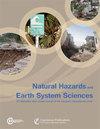1980年至2018年意大利特伦蒂诺-上阿迪杰地区热潮和寒潮风险趋势
IF 4.7
2区 地球科学
Q1 GEOSCIENCES, MULTIDISCIPLINARY
引用次数: 0
摘要
摘要热浪(HWs)和寒潮(CWs)对人们的影响相当大。在局部尺度上绘制极端温度的风险图,考虑危害、暴露和脆弱性之间的相互作用,仍然是一项具有挑战性的任务。在这项研究中,我们以高空间分辨率量化了1980年至2018年意大利特伦蒂诺-上阿迪杰地区的高ws和CWs风险。我们使用每日热浪强度指数(HWMId)和每日寒潮强度指数(CWMId)作为危害指标。为了获得hwand CW风险图,我们结合了以下内容:(i)使用零膨胀Tweedie分布(直接考虑某些年份没有事件)获得的危害发生概率图,(ii)标准化人口密度图,以及(iii)基于八个社会经济指标的标准化脆弱性图。该方法允许我们将风险的每个组成部分相对于风险的总变化的贡献分开。我们发现,在研究期间,在分析区域,HW危害和暴露在统计上显著增加,而CW危害保持不变。整个地区对极端温度的脆弱性都有所下降,但大城市的脆弱性有所增加。该地区40%的地区的艾滋病风险增加,人口密集地区的增幅最大。除了四个主要城市的脆弱性增加和暴露增加了风险水平外,停滞的连续化学污染危害和脆弱性下降导致整体连续化学污染风险水平降低。这些发现可以帮助引导对当地风险缓解的投资,并且这种方法可以潜在地应用于有足够详细数据的其他地区。本文章由计算机程序翻译,如有差异,请以英文原文为准。
Trends in heat and cold wave risks for the Italian Trentino-Alto Adige region from 1980 to 2018
Abstract. Heat waves (HWs) and cold waves (CWs) can have considerable impact on
people. Mapping risks of extreme temperature at local scale, accounting for
the interactions between hazard, exposure, and vulnerability, remains a
challenging task. In this study, we quantify risks from HWs and CWs for the
Trentino-Alto Adige region of Italy from 1980 to 2018 at high spatial
resolution. We use the Heat Wave Magnitude Index daily (HWMId) and the Cold
Wave Magnitude Index daily (CWMId) as the hazard indicators. To obtain HWs
and CW risk maps we combined the following: (i) occurrence probability maps of the hazard
obtained using the zero-inflated Tweedie distribution (accounting directly
for the absence of events for certain years), (ii) normalized population
density maps, and (iii) normalized vulnerability maps based on eight
socioeconomic indicators. The methodology allowed us to disentangle the
contributions of each component of the risk relative to total change in
risk. We find a statistically significant increase in HW hazard and
exposure, while CW hazard remained stagnant in the analyzed area over the
study period. A decrease in vulnerability to extreme temperature spells is
observed through the region except in the larger cities where vulnerability
increased. HW risk increased in 40 % of the region, with the increase
being greatest in highly populated areas. Stagnant CW hazard and declining
vulnerability result in reduced CW risk levels overall, except for the four
main cities where increased vulnerability and exposure increased risk
levels. These findings can help to steer investments in local risk
mitigation, and this method can potentially be applied to other regions
where there are sufficient detailed data.
求助全文
通过发布文献求助,成功后即可免费获取论文全文。
去求助
来源期刊
CiteScore
7.60
自引率
6.50%
发文量
192
审稿时长
3.8 months
期刊介绍:
Natural Hazards and Earth System Sciences (NHESS) is an interdisciplinary and international journal dedicated to the public discussion and open-access publication of high-quality studies and original research on natural hazards and their consequences. Embracing a holistic Earth system science approach, NHESS serves a wide and diverse community of research scientists, practitioners, and decision makers concerned with detection of natural hazards, monitoring and modelling, vulnerability and risk assessment, and the design and implementation of mitigation and adaptation strategies, including economical, societal, and educational aspects.

 求助内容:
求助内容: 应助结果提醒方式:
应助结果提醒方式:


